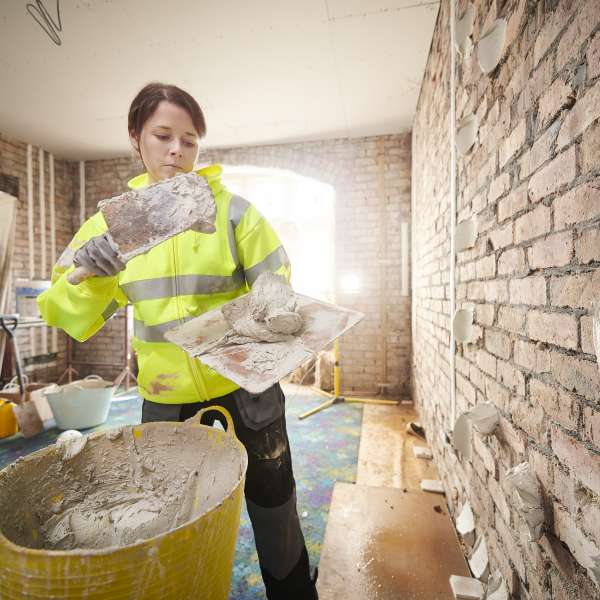
Are you a talented stucco mason or plasterer? Do you want more control over the jobs you take and when you work? It might be time to start a plastering company.
Starting a small stucco and plastering business could be a great step in your trade career. Let’s take a quick look at how to become a plasterer, starting a plastering business, and protecting what you’re building with insurance for plastering and stucco businesses.
Is plastering a good trade?
Plastering and stucco masonry are excellent skilled trades to learn. Demand for these services is high in many areas of the country, with solid employment prospects in many parts of the country.
According to the most recent data from the Bureau of Labor Statistics, plasterers and stucco masons earn an average yearly salary of $54,810 (or $26.35 per hour). Stucco masons in Hawaii have the highest average salaries— $72,630 as of May 2021.
The top five states for employment in the plastering and stucco trade are:
- California – average salary of $61,790 per year
- Florida – $38,840
- Arizona – $45,630
- Utah – $44,790
- New York – (salary info not available)
How to become a plasterer or stucco mason
Many stucco and plastering companies begin as one or two-person businesses. Over time, you may hire other contractors, so you can focus more on managing the business. However, you’ll likely be getting your hands dirty in the beginning.
You might need either a general contractor or a stucco and plastering license to work in your area. These licenses may be issued by your state, county, or city government.
Licensing requirements vary between different states and local areas. However, you will typically be asked to:
- Meet minimum licensing requirements, such as age and residency.
- Meet minimum education and experience requirements.
- Pass a trade and/or safety exam.
- Submit and pass a background check.
- Provide proof of General Liability, Workers’ Compensation, or other mandatory insurance.
- Pay an application fee.
- Renew your license every few years.
Check with your state or local government to understand the licensing requirements for stucco masons and plasterers in your area.
How to start a plastering business
With plastering experience and knowledge to back you up, it may be time to strike out on your own. Here are seven steps to help you start a plastering business:
1. Research your local market
Even if stucco and plastering services are in high demand in your area, you may want to do some research before launching your business. Researching your local market could help you make your business better. You may find gaps in the market that you can fill or learn how to help your business stand out against competitors.
2. Write a business plan
A business plan is like a roadmap or blueprint for your business. It helps you get organized and can help you make decisions for running it. Business plans typically combine information about your business (such as its structure and services) with market research (demand in your area and competitors) and planning (i.e., financial forecasts, budgets, and marketing strategy).
You may be required to present a business plan to apply for small business loans and grants or pitch your business idea to an investor.
3. Apply for licenses and permits
You may need specific licenses and permits to run a stucco and plastering business in your area. In addition to a trade or general contractor license, a business license may also be necessary. You can typically apply for a business license from your state government, though they are issued by city governments in some areas.
Permits may also be required to complete stucco and plastering work. These are typically issued by a city or local jurisdiction.
4. Set up your business finances
Many small business experts recommend keeping your business finances separate from your personal ones. This includes opening business-only bank accounts and tracking your revenue with accounting software. In some cases, these steps may be mandatory, such as if you register your business as a Limited Liability Company (LLC).
You may also need to apply for an Employer Identification Number (EIN) with the IRS, particularly if you plan to hire employees. Your state or city may also require you to register your business to collect sales tax, if applicable.
5. Invest in tools and materials
Quality tools, equipment, and materials help you work efficiently and safely. They also provide your customers with stucco and plastering work that is worth the price you charge.
When you’re on a tight budget, it may be tempting to buy less expensive tools and materials. However, this could end up costing you in the long run. Cheap tools may be more likely to break (or break sooner). You could end up spending more on replacements and repairs than if you’d bought more expensive and higher-quality equipment to begin with.
Similarly, inexpensive materials may result in poor work. Customers could be calling you for repairs or to redo work, which will likely reflect poorly on you and your business.
6. Consider business insurance
As you grow a plastering business, you will likely want to protect it. Insurance for plastering and stucco businesses can help shield your finances from unplanned events that could drain your bank accounts. Without coverage, you may be responsible for legal fees, compensation payments, repairs, and other costly bills.
There are many types of insurance for plastering and stucco businesses that you might consider. For example, a General Liability policy may be necessary to work with certain clients, and Workers’ Compensation might be required by state law if you have employees. A Business Owner’s Policy may be essential if you own business property that you’d like to protect or want a backup plan for unexpected business interruptions.
7. Market your stucco business
Finding customers is a challenge for many trade businesses. Competition can be fierce, especially for high-demand services. A strong marketing plan can help your stucco business stand out from the crowd and encourage customers to hire you instead of someone else.
There are many ways to market a stucco and plastering business. You will likely use a mix of methods, such as online advertising, customer reviews, print ads, or cold calls and emails. A marketing expert can help you create a plan that works for your business. You can also get ideas from your competitors.
How BizInsure helps stucco masons and plasterers
Business insurance is an important part of many people’s small business plans. But with so much else to get done, many business owners put off buying coverage. That’s where BizInsure can help.
BizInsure are business insurance experts. They help small businesses of all sizes get A-rated coverage in minutes. Just enter your details, compare quotes and buy—all in about 10 minutes.
Get quotes for your stucco and plastering business today and save with BizInsure.
As with any insurance, coverage will be subject to the terms, conditions and exclusions contained in the policy wording. The information contained on this guide is general only and should not be relied upon as advice.
The number of quotes provided varies between products, occupations and other underwriting factors determined by the insurers.
© Copyright 2023 BizInsure LLC, 2015 ALL RIGHTS RESERVED BizInsure LLC; CA DBA: Simple, Smart, BizInsure Insurance Agency LLC; NY DBA: BizInsure Services LLC; NH DBA: Simple, Smart, BizInsure Insurance Agency; PA DBA: BizInsure Services LLC. 2950 Buskirk Ave Suite 300, Walnut Creek CA 94597. License #0H81929



